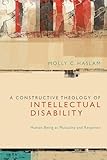A Constructive Theology of Intellectual Disability : Human Being as Mutuality and Response / Molly C. Haslam.
Material type: TextPublisher: New York, NY : Fordham University Press, [2022]Copyright date: ©2012Description: 1 online resource (144 p.)Content type:
TextPublisher: New York, NY : Fordham University Press, [2022]Copyright date: ©2012Description: 1 online resource (144 p.)Content type: - 9780823239412
- 9780823290741
- online - DeGruyter
| Item type | Current library | Call number | URL | Status | Notes | Barcode | |
|---|---|---|---|---|---|---|---|
 eBook
eBook
|
Biblioteca "Angelicum" Pont. Univ. S.Tommaso d'Aquino Nuvola online | online - DeGruyter (Browse shelf(Opens below)) | Online access | Not for loan (Accesso limitato) | Accesso per gli utenti autorizzati / Access for authorized users | (dgr)9780823290741 |
Frontmatter -- Contents -- Introduction -- 1. Gordon Kaufman: Human Being as Intentional Agent -- 2. George Lindbeck: Human Being as Language User -- 3. Human Being in Relational Terms: A Phenomenology -- 4. Martin Buber’s Anthropology -- 5. Imago Dei as Rationality or Relationality: History and Construction -- Notes -- Bibliography
restricted access online access with authorization star
http://purl.org/coar/access_right/c_16ec
Responding to how little theological research has been done on intellectual (as opposed to physical) disability, this book asks, on behalf of individuals with profound intellectual disabilities, what it means to be human. That question has traditionally been answered with an emphasis on an intellectual capacity—the ability to employ concepts or to make moral choices—and has ignored the value of individuals who lack such intellectual capacities. The author suggests, rather, that human being be understood in terms of participation in relationships of mutual responsiveness, which includes but is not limited to intellectual forms of communicating. She supports her argument by developing a phenomenology of how an individual with a profound intellectual disability relates, drawn from her clinical experience as a physical therapist. She thereby demonstrates that these individuals participate in relationships of mutual responsiveness, though in nonsymbolic, bodily ways. To be human, to image God, she argues, is to respond to the world around us in any number of ways, bodily or symbolically. Such an understanding does not exclude people with intellectual disabilities but rather includes them among those who participate in the image of God.
Mode of access: Internet via World Wide Web.
In English.
Description based on online resource; title from PDF title page (publisher's Web site, viewed 03. Jan 2023)


